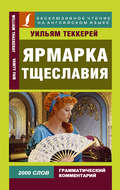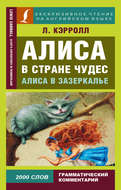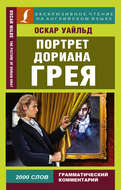Kitobni o'qish: «Гордость и предубеждение / Pride and Prejudice»
© Матвеев С. А., адаптация текста, комментарии, словарь
© ООО «Издательство АСТ», 2017
Chapter 1
Everybody knows that a single man in possession of a good fortune1 must look for a wife.
When such a man enters a neighbourhood, the surrounding families begin to think, that he is considered the rightful property of some one or other of their daughters.
“My dear Mr. Bennet,” said Mrs. Bennet to her husband, “have you heard that Netherfield Park is let at last?”
Mr. Bennet replied that he had not.
“But it is,” returned she.
Mr. Bennet made no answer.
“Do you not want to know who has taken it?” cried his wife impatiently.
“What is his name?”
“Bingley.”
“Is he married or single?”
“Oh! Single, my dear, to be sure! A single man of large fortune; four or five thousand a year. What a fine thing for our girls!”
“How so? How can it affect them?”
“My dear Mr. Bennet,” replied his wife, “how can you be so tiresome! You must know that I am thinking of his marrying one of them.2 When a woman has five grown-up daughters, she ought to think about their future. My dear, you must indeed go and see Mr. Bingley when he comes into the neighbourhood. Consider your daughters. Only think what an establishment it would be for one of them.”
“My daughters have nothing to recommend them,” replied he; “they are all silly and ignorant like other girls.”
Mr. Bennet was a mixture of quick mind, sarcastic humour, reserve, and caprice, that the experience of three-and-twenty years had been insufficient to make his wife understand his character. Her mind was less difficult to develop. She was a woman of mean understanding,3 little information, and uncertain temper.4 When she was discontented, she treated herself nervous. The business of her life was to get her daughters married;5 she adored visiting and news.
Chapter 2
Mr. Bennet was among the earliest of those who told Mr. Bingley about his coming. Observing his second daughter decorated a hat, he suddenly told her:
“I hope Mr. Bingley will like it, Lizzy.”
“We will never know what Mr. Bingley likes,” said her mother, “if we do not visit him.”
“And what will you say, Mary? You are a young lady of deep reflection,6 I know, and read great books and make extracts.”
Mary wished to say something sensible, but did not know how.
“While Mary is adjusting her ideas,” he continued, “let us return to Mr. Bingley. I have actually paid the visit, so we cannot escape the acquaintance now.”
The astonishment of the ladies was just what he wished; Mrs. Bennet began to declare that it was what she had expected all the time.
“How good it was of you, my dear Mr. Bennet! I was sure you loved your girls too well to neglect such an acquaintance. Well, how pleased I am!”
“Now, Kitty, you may cough as much as you want,” said Mr. Bennet; and, as he spoke, he left the room.
“What an excellent father you have, girls!” said she, when the door was shut. Lydia, my love, though you are the youngest, I can say Mr. Bingley will dance with you at the next ball.”
“Oh!” said Lydia stoutly, “I am not afraid; I am the youngest, but I’m the tallest.”
Chapter 3
Mr. Bingley was quite young, wonderfully handsome, extremely agreeable, and he meant to be at the next assembly with a large party. Nothing could be more delightful! To be fond of dancing7 was a certain step towards falling in love.
“If I can see one of my daughters happily settled at Netherfield,” said Mrs. Bennet to her husband, “and all the others equally well married, I shall have nothing to wish for.8”
In a few days Mr. Bingley returned Mr. Bennet’s visit, and sat about ten minutes with him in his library. He had hoped to see young ladies, of whose beauty he had heard much; but he saw only the father.
Mr. Bingley was going to bring twelve ladies and seven gentlemen with him to the assembly. The girls grieved over such a number of ladies, but were comforted the day before the ball by hearing, that instead of twelve he brought only six with him from London – his five sisters and a cousin. And when the party entered the assembly room it consisted of only five altogether – Mr. Bingley, his two sisters, the husband of the eldest, and another young man.
Mr. Bingley was good-looking and gentlemanlike; he had a pleasant look, and easy, unaffected manners. His sisters were fine women. His brother-in-law merely looked the gentleman; but his friend Mr. Darcy soon drew the attention of the room by his fine, tall person, handsome features, noble mien, and the report of his having ten thousand a year.9 The gentlemen declared him to be a real man, the ladies declared he was much handsomer than Mr. Bingley, and he was looked at10 with great admiration for about half the evening. But his manners made his popularity go down. He was very proud and he was above his company.

Mr. Bingley had soon made himself acquainted with all the people in the room; he was lively and unreserved, danced every dance, and was angry that the ball closed so early. Such amiable qualities must speak for themselves. What a contrast between him and his friend! Mr. Darcy danced only once with Miss Bingley, and spent the rest of the evening in walking about the room. His character was decided.11 He was the proudest, most disagreeable man in the world, and everybody hoped that he would never come there again. Amongst the most violent against him was Mrs. Bennet.
Elizabeth Bennet was sitting by the wall. Mr. Darcy was standing near enough for her to hear a conversation between him and Mr. Bingley, who came from the dance for a few minutes, to force his friend to join it.
“Come, Darcy,” said he, “Dance! I hate to see you standing here in this stupid manner.”
“I certainly shall not. There is no woman in the room whom it would not be a punishment to me to dance with.”
“Oh,” cried Mr. Bingley, “Upon my honour,12 I never met so many pleasant girls in my life as I have this evening.”
“You are dancing with the only handsome girl in the room,” said Mr. Darcy, looking at the eldest Miss Bennet.
“Yes, she is the most beautiful person I ever met! But there is one of her sisters sitting just behind you, who is very pretty, and very agreeable.”
“Which do you mean?” and turning round he looked for a moment at Elizabeth. He withdrew his eyes and coldly said: “She is tolerable, but not handsome enough to bother me. My friend, you are just wasting your time with me.”
Mr. Bingley followed his advice. Mr. Darcy walked out; and Elizabeth did not have cordial feelings toward him.
But in general the evening went pleasantly to the whole family. Mrs. Bennet was very glad. Mr. Bingley had danced with her eldest daughter twice. Jane was happy, too. Elizabeth felt Jane’s pleasure.13 Catherine and Lydia had been lucky enough never to be without partners. They returned, therefore, in good spirits to Longbourn, the village where they lived.
“Oh! my dear Mr. Bennet,” said Mrs. Bennet as she entered the room, “we have had a most delightful evening, a most excellent ball. I wish you had been there. Everybody said how well Jane looked; and Mr. Bingley danced with her twice! Only think of that, my dear; he actually danced with her twice! and she was the only creature in the room that he asked a second time. He is so excessively handsome! And his sisters are charming women. I never in my life saw anything more elegant than their dresses.”
Then she told about the shocking rudeness of Mr. Darcy.
“But I can assure you,” she added, “that Lizzy did not lose much; for he is a most disagreeable, horrid man. He walked here, and he walked there, I quite detest this man.”
Chapter 4
When Jane and Elizabeth were alone, Jane expressed to her sister just how very much she admired Mr. Bingley.
“He is just what a young man ought to be,” said she, “sensible, good-humoured, lively; and I’ve never seen such happy manners!”
“He is also handsome,” replied Elizabeth, “His character is thereby complete.”
“I was very much surprised when he asked me to dance a second time. I did not expect such a compliment.”
“Did not you? What could be more natural than his asking you again? He noticed that you were the prettiest girl in the room. Well, he certainly is very agreeable. You have liked many a stupider person.14”
“Dear Lizzy!”
“Oh! you like people in general. You never see a fault in anybody. All the world are good and agreeable in your eyes. I never heard you speak ill of a person in your life.”
“I always speak what I think.”
“I know; and it is that which makes the wonder. With your good sense, to be so honestly blind to the follies and nonsense of others! And so you like Mr. Bingley’s sisters, too, do you? Their manners are not equal to his.”
“Certainly not – at first. But they are very pleasing women when you talk to them. Miss Bingley wants to live with her brother, and keep his house.”
Elizabeth listened in silence. Mr. Bingley’s sisters were in fact very fine ladies; they were rather handsome, had been educated in one of the first private seminaries in town, had a fortune of twenty thousand pounds, and thought well of themselves, and meanly of others. They were of a respectable family in the north of England.
Mr. Bingley inherited property to the amount of nearly a hundred thousand pounds from his father. Between him and Darcy there was a very steady friendship, in spite of great opposition of character. Darcy liked the easiness, openness, and ductility of his temper. In understanding, Darcy was the superior. Bingley was not stupid, but Darcy was cleverer.
The manner in which they spoke of the assembly was sufficiently characteristic. Bingley had never met with more pleasant people or prettier girls in his life; everybody had been most kind and attentive to him; there had been no formality, no stiffness; he had soon felt acquainted with all everybody. And, as to Miss Bennet,15 he could not imagine an angel more beautiful. Darcy, on the contrary, had seen a collection of people in whom there was little beauty and no fashion, for none of whom he had felt the smallest interest, and from none received either attention or pleasure. Miss Bennet was pretty, but she smiled too much.
Chapter 5
Within a short walk of Longbourn lived a family with whom the Bennets were particularly intimate. Lady Lucas was a very good kind of woman, not too clever to be a valuable neighbour to Mrs. Bennet. Her eldest daughter, a sensible, intelligent young woman, about twenty-seven, was Elizabeth’s best friend.
Miss Lucas and Miss Bennet met to talk about the ball, it was absolutely necessary.
“You began the evening well, Charlotte,” said Mrs. Bennet to Miss Lucas. “You were Mr. Bingley’s first choice.”
“Yes; but he seemed to like his second better.”
“Oh! you mean Jane, I suppose, because he danced with her twice.”
“But Darcy!” said Charlotte. “He is terrible.”
“Miss Bingley told me,” said Jane, “that he never speaks much, unless among his intimate acquaintances. With them he is agreeable.”
“I wish he had danced with Eliza,” said Miss Lucas.
“Another time, Lizzy,” said her mother, “I would not dance with him, if I were you.”
“I believe, ma’am, I may promise you never to dance with him.”
“His pride,” said Miss Lucas, “does not offend me so much as pride often does, because there is an excuse for it. We cannot wonder that a young man, with family, fortune, everything, should think highly of himself. He has a right to be proud.”
“Pride,” observed Mary, “is a very common failing, I believe. A person may be proud without being vain. Pride relates more to our opinion of ourselves, vanity to what we would have others think of us.”
“If I were as rich as Mr. Darcy,” cried a young Lucas, who came with his sisters, “I should not care how proud I was. I would keep a pack of dogs,16 and drink a bottle of wine a day.”
Chapter 6
The ladies of Longbourn soon visited Netherfield. The visit was soon returned. Miss Bennet’s pleasing manners made good impressions; and though the mother was found to be intolerable,17 and the younger sisters not worth speaking to,18 the two eldest were very nice and well-behaved. By Jane, this attention was received with the greatest pleasure, but could not like them.
Occupied in observing Mr. Bingley’s attentions to her sister, Elizabeth was far from suspect-ing that she was herself becoming an object of some interest in the eyes of his friend. Mr. Darcy was caught by her playfulness. But Elizabeth did not know anything. To her he was only the man who had not thought her handsome enough to dance with.19
He began to wish to know more of her. Once at Sir William Lucas’s a large party was assembled.
Sir William began: “What a charming amusement for young people the balls are, Mr. Darcy! There is nothing like dancing after all.”
“Certainly, sir; every savage can dance.”
Sir William only smiled. “Your friend performs delightfully,” he continued after a pause; “Do you often dance?”
“Never, sir.”
He paused in hopes of an answer; and Elizabeth at that instant moved towards them. Sir William called out to her:
“My dear Miss Eliza, why are you not dancing? Mr. Darcy, you must allow me to present this young lady to you as a very desirable partner. You cannot refuse to dance, I am sure when so much beauty is before you.” And, taking her hand, he gave it to Mr. Darcy. But Elizabeth instantly drew back, and said to Sir William:
“Indeed, sir, I have not the least intention of dancing.”
Mr. Darcy requested to be allowed the honour of her hand, but in vain. Elizabeth was determined.
“You dance so well, Miss Eliza, that it is cruel to deny me the happiness of seeing you.”
“Mr. Darcy is all politeness,20” said Elizabeth, smiling. She looked archly, and turned away.
Chapter 7
Mr. Bennet’s property consisted almost entirely in an estate of two thousand a year, which, unfortunately for his daughters, was entailed, in default of heirs male, on a distant relation.21
The village of Longbourn was only one mile from Meryton; a most convenient distance for the young ladies, who were usually going three or four times a week, to pay their duty to their aunt. The two youngest of the family, Catherine and Lydia, went there very often. Meryton was the headquarters for the officers.
Young sisters could talk of nothing but officers; and Mr. Bingley’s large fortune was worthless in their eyes when opposed to the officer’s coat.
After listening one morning to their talking, Mr. Bennet observed:
“You must be two of the silliest girls in the country. I have suspected it some time, but I am now convinced.”
Catherine was disconcerted, and made no answer; but Lydia, with perfect indifference, continued to express her admiration of Captain Carter, who was going the next morning to London.
“My dear Mrs. Bennet, you must not expect such girls to have the sense of their father and mother,” said Mr. Bennet.
“When they get to our age, I dare say they will not think about officers any more. I remember the time when I liked a red coat myself very well – and, indeed, if a smart young colonel, with five or six thousand a year, should want one of my girls I shall not say “no” to him.”
Suddenly a letter for Miss Bennet arrived; it came from Netherfield, and the servant waited for an answer. Mrs. Bennet’s eyes sparkled with pleasure,
“Well, Jane, who is it from? What is it about? What does he say? Well, Jane, make haste and tell us; make haste, my love.”
“It is from Miss Bingley,” said Jane, and then read it aloud.
“MY DEAR FRIEND, —
“If you are not so kind to dine today with Louisa and me, we will hate each other, because a whole day between two women can never end without a quarrel. Come as soon as you can. My brother and the gentlemen will dine with the officers.
Yours,
“Caroline Bingley”
“With the officers!” cried Lydia.
“Dining out,” said Mrs. Bennet, “that is very unlucky.”
“Can I have the carriage?” said Jane.
“No, my dear, you had better go on horseback,22 because it seems likely to rain; and then you must stay all night.”
So Jane was therefore obliged to go on horseback, and her mother attended her to the door. Soon it rained hard. Her sisters were worried about her, but her mother was delighted. The rain continued the whole evening; Jane certainly could not come back.
“This was a lucky idea of mine, indeed!” said Mrs. Bennet. But the next morning a servant from Netherfield brought the following note for Elizabeth:
“My dearest Lizzy, —
“I find myself very unwell this morning, which, I suppose, is due to my getting wet through yesterday. My kind friends invited me to stay here. The doctor will come in a while, so do not worry. I have a sore throat and headache.
– Your Jane.”
“Well, my dear,” said Mr. Bennet, when Elizabeth had read the note aloud, “if your daughter should die, it would be a comfort to know that it was all in pursuit of Mr. Bingley.”
“Oh! I am not afraid, people do not die of colds. She will be taken good care of.23 As long as she stays there, it is all very well. I would go and see her if I could have the carriage.”
Elizabeth decided to go with her, but she could not ride the horse, so she decided to walk. She declared her resolution.
“How can you be so silly,” cried her mother, “in all this dirt!”
“But I shall see Jane – that is all I want. The distance is nothing when one has a motive; only three miles. I shall be back by dinner.”
Elizabeth’s appearance made a great surprise. She was walking three miles so early, in such dirty weather. It was incredible to everybody. She was received, however, very politely by them; and in their brother’s manners there was something better than politeness; there was good humour and kindness. Mr. Darcy said very little, he was thinking of her beauty.

Miss Bennet was not well enough to leave her room. Elizabeth was glad to see her immediately.
When breakfast was over Mr. Bingley’s sisters came; and Elizabeth began to like them, when she saw how much affection they showed for Jane. The doctor came, and examined his patient. He that she had caught a violent cold; advised her to return to bed. The advice was followed readily. Elizabeth did not quit her room for a moment.
Chapter 8
At five o’clock the two ladies retired to dress, and at half-past six Elizabeth was called to dinner.
Jane was not better. The sisters, on hearing this, repeated three or four times how much they were grieved, how shocking it was to have a bad cold, and how they disliked being ill themselves.
When dinner was over, she returned directly to Jane, and Miss Bingley began to abuse Elizabeth as soon as she was out of the room. Her manners were considered very bad indeed, a mixture of pride and impertinence; she had no conversation,24 no style, no beauty.
“She has nothing, in short, to recommend her. Of course, she is an excellent walker. I shall never forget her appearance this morning.”
“Why did she come here, because her sister had a cold? Her hair, so untidy!”
“I thought Miss Elizabeth Bennet looked remarkably well, Louisa,” said Bingley; “when she came into the room this morning.”
“To walk three miles, or four miles, or five miles, above her ankles in dirt, and alone, quite alone! What could she mean by it?”
A short pause followed this speech, and the sisters began again:
“I like Miss Jane Bennet very much, she is really a very sweet girl. But with such a father and mother, and such low connections, I am afraid there is no chance for her in the life.”
To this speech Bingley made no answer.
Jane was still very poorly, and Elizabeth would not quit her at all, till late in the evening. On entering the drawing-room she found the whole party playing cards, and was immediately invited to join them. But she declined it, and said she would read a book instead.
“Do you prefer reading to cards? That is very strange.”
“Miss Eliza Bennet,” said Miss Bingley, “despises cards. She is a great reader.”
“Not at all, I am not a great reader,” cried Elizabeth; “and I have pleasure in many things.”
Elizabeth walked towards the table where a few books were lying. “I am astonished,” said Miss Bingley, “that my father has such a small collection of books. What a delightful library you have, Mr. Darcy!”
“It is good,” he replied, “I am always buying books.”
“It is amazing to me,” said Bingley, “how young ladies can have patience to be so educated as they all are.”
“All young ladies educated! My dear Charles, what do you mean?”
“Yes, all of them, I think. They all paint pictures, and net purses. I scarcely know anyone who cannot do all this.”
“ I am very far from agreeing with you in your estimation of ladies in general,” said Darcy, “I cannot name five women, that are really educated.”
“Nor I, I am sure,” said Miss Bingley.
“Then,” observed Elizabeth, “in your opinion, who is an educated woman?”
“Oh! No one can be really educated who does not know necessary things. A woman must know music, singing, drawing, dancing, and the modern languages, to deserve the word; and besides all this, she must possess a certain something in her air25 and manner of walking, the tone of her voice, her address and expressions.”
“All this she must possess,” added Darcy, “and the most important thing, she must read a lot.”
The conversation was over, and Elizabeth soon afterwards left the room.
“Elizabeth Bennet,” said Miss Bingley, when the door was closed, “is one of those young ladies who try recommend themselves to the men; and with many men it succeeds.”
Elizabeth joined them again only to say that her sister was worse, and that she could not leave her. Bingley was quite uncomfortable; his sisters declared that they were miserable.








